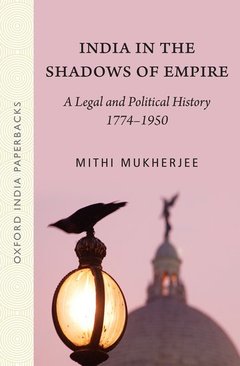Description
India in the Shadows of Empire
A Legal and Political History (1774-1950)
Author: Mukherjee Mithi
Language: English
Subject for India in the Shadows of Empire:
Publication date: 03-2012
316 p. · 13.8x21.6 cm · Paperback
Out of Print
316 p. · 13.8x21.6 cm · Paperback
Out of Print
Description
/li>Contents
/li>Biography
/li>
This pioneering research offers a sweeping new interpretation of the complex and seemingly contradictory nature of Indian democracy and polity. In contrast to much of existing scholarship, it joins the colonial and postcolonial periods in Indian history into a seamless narrative. This book explains the postcolonial Indian polity by presenting an alternative historical narrative of the British Empire in India and India's struggle for Independence. It pursues this narrative along two major trajectories. On the one hand, it focuses on the role of imperial judicial institutions and practices in the making of both the British Empire and the anti-colonial movement under the Congress, with the lawyer as political leader. On the other hand, it offers a novel interpretation of Gandhi's non-violent resistance movement as being different from the Congress. It shows that the Gandhian movement, as the most powerful force largely responsible for India's Independence, was anchored not in western discourses of political and legislative freedom but rather in Indian traditions of renunciative freedom, with the renouncer as leader. This book would be of considerable interest to students and scholars of law, modern Indian history, and political science. It will also have a significant general appeal.
Acknowledgements. Introduction. 1. The Colonial and the Imperial: India and Britain in the Impeachment Trial of Warren Hastings,. 2. Conflict of Sovereignty: The Judiciary, the Executive, and the Emergence of the Indian Legislative Council as a Court of Law,. 3. Into the Labyrinth: The Birth of Justice as a Discourse of Governance,. 4. 'Vakil Raj': The Indian National Congress and the Birth of the Lawyer as Political Representative,. 5. From Imperial Justice to Transcendental Freedom: The Samnyasin as Leader in the Movement for National Independence,. 6. An Imperial Constitution? Justice as Equity and the Making of the Indian Constitution,. 7. India after Independence: A Tale of Conflicting Legacies,. Bibliography. Index.
Mithi Mukherjee is Associate Professor, University of Colorado at Boulder, USA.
© 2024 LAVOISIER S.A.S.

